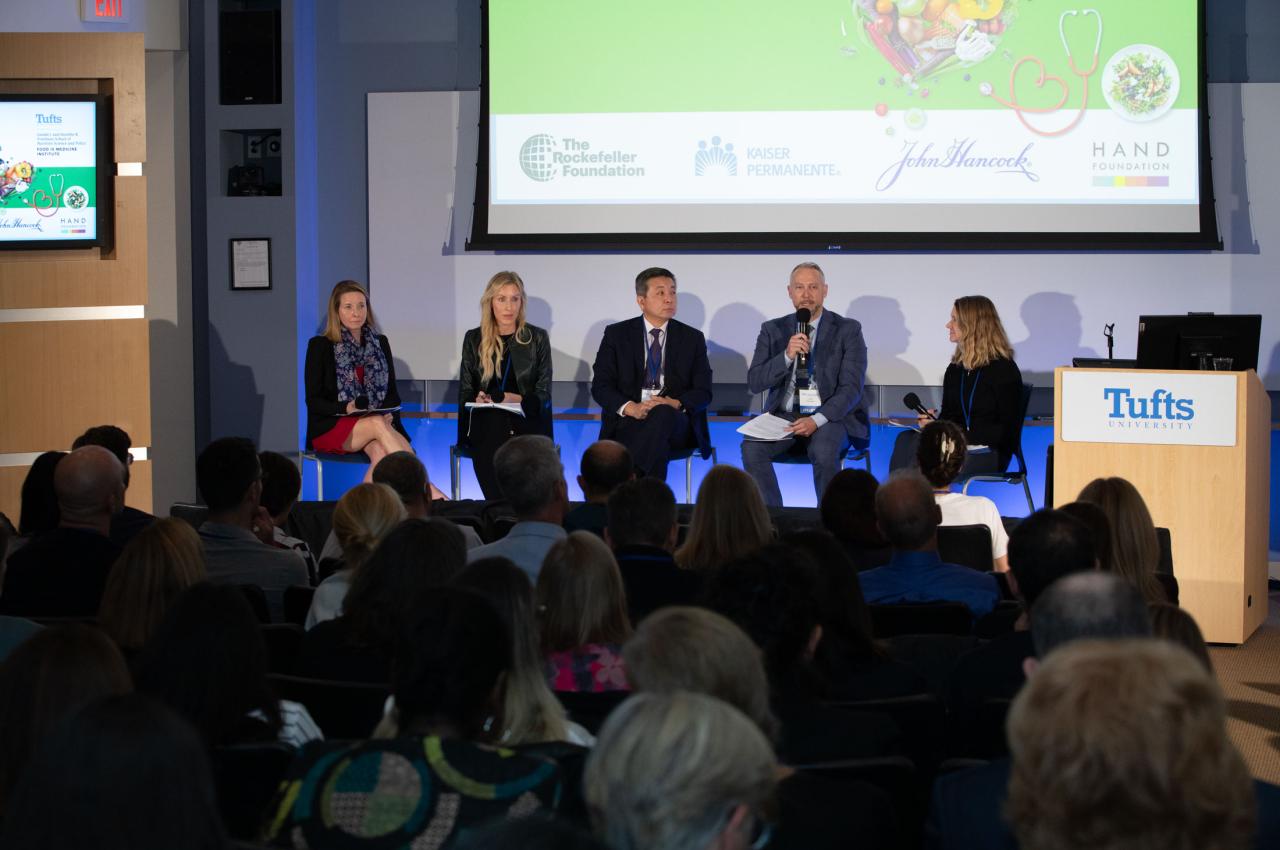Food Is Medicine: A Movement at a Tipping Point
The Food Is Medicine (FIM) movement is rapidly transforming how we think about nutrition as a central pillar of health care. At the third annual Food Is Medicine National Summit, hosted by the Food Is Medicine Institute at the Gerald J. and Dorothy R. Friedman School of Nutrition Science and Policy at Tufts University, nutrition experts, policymakers, clinicians, and community leaders gathered to chart the future of this growing national effort.
“About 90% of Americans agree eating more healthy foods is important to prevent the onset of many health conditions, and 86% agree that eating healthy foods should be a priority for treating major health conditions,” Dariush Mozaffarian, cardiologist and director of the Food Is Medicine Institute, said during the first keynote address, when he cited a national poll published earlier this year. “Americans really get this, but at the same time, they’re confused about how to eat healthy, because it’s complicated.”
Those thoughts were echoed by cardiologist Victor Dzau, president of the National Academy of Medicine, during the summit’s second keynote address.
“Almost every individual American wants to know what they should eat, what's healthy, what's not. But the amount of contradictory, inconsistent information and misinformation on the internet is very high, and it's hard to know what to believe,” Dzau said. “We as experts and clinicians should be part of a solution to provide reliable information to the public that improves public health, because we know that poor individual health choices can undermine nutrition.”
Cardiologist Victor Dzau, president of the National Academy of Medicine, gave the keynote address at the Food Is Medicine Summit at Tufts University. Photo: Courtesy of the Food Is Medicine Institute
With appearances from U.S. Representatives Jim McGovern of Massachusetts and Chellie Pingree of Minnesota, along with Senators Roger Marshall of Kansas and Bill Frist of Tennessee, the summit made clear that the movement is ready to scale—but it will take continued research, policy innovation, and cross-sector collaboration to make food a true prescription for health.
Below are key takeaways from the Oct. 8 summit, which highlighted progress, challenges, and opportunities to strengthen evidence and improve access to Food Is Medicine programs.
1. Nutrition Is Health Care
Poor nutrition is now the leading risk factor for death and disability in the United States, Mozaffarian said, surpassing tobacco and alcohol. Six in 10 adults in the U.S. have a chronic disease, and four out of 10 have two or more. Diet-related diseases such as diabetes, heart disease, and obesity affect nearly every American family—and cost the nation over $1 trillion annually.
Medical experts emphasized that food must be treated as a core medical intervention, not just a lifestyle choice.
2. Evidence-Based Impact
Studies funded by the Rockefeller Foundation, Kaiser Permanente, the American Heart Association, and others are building the evidence that programs that deliver medically tailored meals and produce prescriptions are showing positive, measurable results for patients, such as:
- Reduced hospitalizations and ER visits
- Improved blood pressure and A1C, which measures glucose in the blood
- Lower health care costs—up to $24 billion annually, according to some estimates
3. Barriers to Healthy Eating Are Real
Cost remains the top barrier, but other big ones include family traditions and knowledge about which foods are considered healthy, according to the survey, which was published in the journal Health Affairs. That there are limited options available in stores is a common complaint from consumers, and fifth on the list is that stores are too far away.
People also cited a lack of time to cook, knowledge of how to cook, and access to cooking equipment as reasons for not making healthier choices.
“If you give people dollars and they have barriers of family traditions, taste, and knowledge, they’re going to have trouble shopping for healthy foods,” Mozaffarian said. “Food Is Medicine is about understanding these barriers for the individual and the community, and addressing the barriers in a much more precise way.”
Poor nutrition is now the leading risk factor for death and disability in the United States, surpassing tobacco and alcohol, said Dariush Mozaffarian, cardiologist and director of the Food Is Medicine Institute, during his address at the Food Is Medicine Summit. Photo: Courtesy of the Food Is Medicine Institute
4. Policy Momentum Is Building
States are leading the way with policy changes that will allow more Food Is Medicine programs, multiple experts said during the summit. More than 13 states have Medicaid waivers to test nutrition programs in health care and cover Food Is Medicine. A dozen states will pilot Supplemental Nutrition Assistance Program (SNAP) restrictions on soda and candy in 2026.
Bipartisan bills in Congress aim to expand access to medically tailored meals. However, federal budget pressures and regulatory gaps—like the GRAS loophole, which allows most food additives to bypass review by the U.S. Food and Drug Administration (FDA)—remain major hurdles.
5. Technology and Trust
A collaboration between Tufts University, Google, and the National Academy of Medicine is tackling misinformation by improving the quality of nutrition information online. Using generative AI, the project aims to deliver reliable, culturally inclusive, and evidence-based answers to common nutrition questions.
6. GLP-1 Medications: A Wake-Up Call
With the rise of GLP-1 drugs being prescribed for weight loss, industry professionals at the summit underscored the need for nutrition and lifestyle support alongside medication. Without it, patients often regain the weight they lost and face long-term health risks. Food Is Medicine programs offer a sustainable, cost-effective complement to pharmaceutical care when it comes to obesity.
7. Empowerment, Not Shame
One of the themes repeated throughout the summit was that Food Is Medicine is not just about health—it’s about dignity, culture, and access. Programs must be designed with input from patients, community health centers, and local food systems, experts agreed. The goal should be to empower individuals, not shame them, and ensure that everyone—regardless of income or zip code—can eat well and live well.
The recorded livestream of the 2025 Food Is Medicine Summit is available on YouTube.













